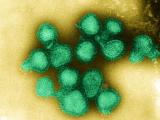Oct 26, 2011 (CIDRAP News) – The US Food and Drug Administration (FDA) said today that people who were immunized against flu with jet injectors, an off-label practice some pharmacies and health departments have recently used, don't need to be revaccinated with a standard needle and syringe.
The move follows an Oct 21 advisory from the FDA urging health providers not to use needle-free injector devices to administer flu vaccines. Some pharmacies and health departments have been offering needle-free flu vaccines, but it's not clear how widespread the practice is.
In an update today, the FDA said inactivated flu vaccines labeled for intramuscular injection are intended to be used only with a sterile needle and syringe, a recommendation that is based on clinical studies submitted to the FDA during vaccine approval. It said safety and effectiveness information on delivery of flu vaccines by jet injector has not been submitted to the FDA, and no inactivated flu vaccines have been approved and labeled for administration by jet injector.
The update said jet injectors that have been cleared by the FDA should be used only to deliver medications and vaccines that have been approved and specifically labeled for delivery with a jet injector. So far, only the measles, mumps, and rubella vaccine has been approved for immunization with jet injection.
Jet injectors subject the vaccine to different pressures than occur with administration by sterile needle and syringe, which could change the vaccine's effectiveness and safety, according to the FDA.
Data on administration of flu vaccine with jet injectors are limited, the FDA said. A study published in a 2001 issue of Vaccine reported that the immune response to flu vaccine delivered with jet injector was comparable to the response to the traditional needle-and-syringe method. Subjects who received their flu vaccine via jet injection were more likely to have pain and redness at the injection site. A study earlier this month, also in Vaccine, found similar immune responses in the two groups, with those receiving the jet injection reporting redness and swelling at the injection site. The FDA said the two studies did not include infants, children, or older adults.
Based on that limited data, the FDA said it and the US Centers for Disease Control and Prevention (CDC) believe that people who got their flu vaccine by jet injector do not need to be reimmunized.
The topic came up today during influenza vaccine discussions during the CDC's Advisory Committee on Immunization Practices (ACIP) meeting. Wendy Keitel, MD, who chairs ACIP's flu vaccine working group, said federal health officials received reports of concerns about the practice. Keitel said she had seen flyers about needle-free vaccines and assumed they were referring to the live attenuated influenza vaccine (LAIV), which is delivered intranasally as a spray.
"As we investigated, we found a number of providers were offering the (jet injection) option," she said.
Dr Stephan Foster, PharmD, an ACIP liaison from the American Pharmacists Association (APhA), said the group contacted pharmacy chains the same day the FDA issued its first advisory. He said the APhA doesn't encourage the practice.
Foster and other ACIP members wondered if the FDA will hold more discussions on future use of jet injectors for flu vaccination.
Heather Potters, chairman of PharmaJet, a company based in Golden, Colo., that makes jet injectors, told ACIP members that the company is committed to ensuring that the devices are used according to clearance requirements. She said the company received regulatory clearance in 2009 for a device that was used by state and county health officials in New Jersey for seasonal and 2009 H1N1 flu vaccination.
She said jet injectors have been used successfully in the clinical setting for more than 50 years and that the new generation of devices offers a safer needle-free option that can offer cost savings and efficiency. She added that PharmaJet hopes to meet with the FDA next week to discuss what vaccine companies would need to do to make product insert modifications. "We're caught in the middle, if none of the vaccine makers are willing to," she said.
See also:
Oct 26 FDA update
Oct 24 CIDRAP News story "FDA advises providers to stop offering needle-free flu vaccines"



















